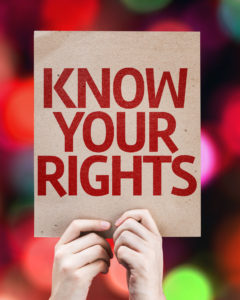
American adult citizens have numerous rights. We have the right to vote, the right to bear arms and the freedom to practice the religion of our choosing. We don’t always think about our rights as citizens, and sometimes we flat out take them for granted, but when you get into a sticky situation, you’ll want to be sure you know your rights and your freedom to express them. Today, we talk about three rights each citizen has during a police encounter or arrest that can help keep you out of trouble.
Knowing Your Rights
There are three main rights everyone should remember when they have a run in with the law. All three of these laws are in the Bill of Rights, and they are actually sandwhiched together as amendments four through six. We’ll explain why they are important below.
4th Amendment – The Right To Protection Against Unreasonable Searches and Seizures: This protection is important because it can keep you out of trouble in the first place. This protection suggests that the ends do not justice the means if due process isn’t followed. For example, a police officer can’t just come into your house looking for drugs without a warrant. If they search unlawfully, even if they find evidence of illegal activity, that cannot be used against the suspect in the court of law. How This Helps You – Regardless of whether or not you have drugs in your trunk or in your home, you do not need to let the cop search your vehicle or home without a warrant. The cop may try to trick you by saying something along the lines of “If you have nothing to hide, you’ll let me search,” or “You not letting me search is making me suspicious,” but as long as you let them know that you are simply expressing your 4th amendment rights and that you’ll gladly acquiesce to a search if a warrant is presented, you should have nothing to fear.
5th Amendment – The Right To Remain Silent: This is an oft-overlooked right that many people fail to express to the disappointment of their attorney. When being read their Miranda Rights, most people hear the first seven words, “You have the right to remain silent,” and fail to grasp the nature of the following words, “anything you say can and will be used against you in the court of law.” This means any foul or abusive language could be used to make a case for resisting arrest or disturbing the peace, but it also means that any admissions you make can serve to help the state’s case against you. How This Helps You – Express your 5th amendment rights! Remain silent, because the cops are not on your side, at least from the standpoint that they will be arguing for the prosecution while you are obviously the defendant. Don’t help them make their case against you. Stay silent, unless you’re also choosing to express your 6th Amendment rights, which are…
6th Amendment – The Right To An Attorney: Although the sixth amendment guarantees a variety of protections, the main point we’re focusing on is that every person has the right to an attorney to defend them against legal charges. Just like the above amendment, you should strongly consider expressing that right. You might think that an attorney will be expensive, but oftentimes they can save you money in the long run by getting the charges reduced or dismissed. How This Helps You – Odds are you don’t cut your own hair, fill your own cavities or perform your own surgery, you let the professionals handle it. Fighting a criminal charge should be no different. Hire a skilled attorney to do the work for you, because this is specifically what they are trained to do. They’ll know things you didn’t even think of, and oftentimes that can be the difference between a guilty charge and going free.





